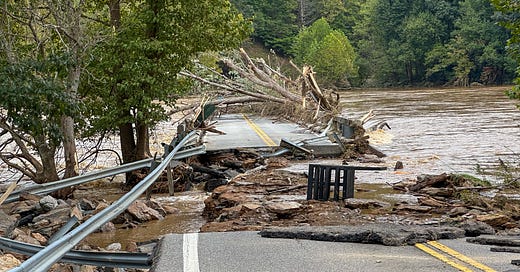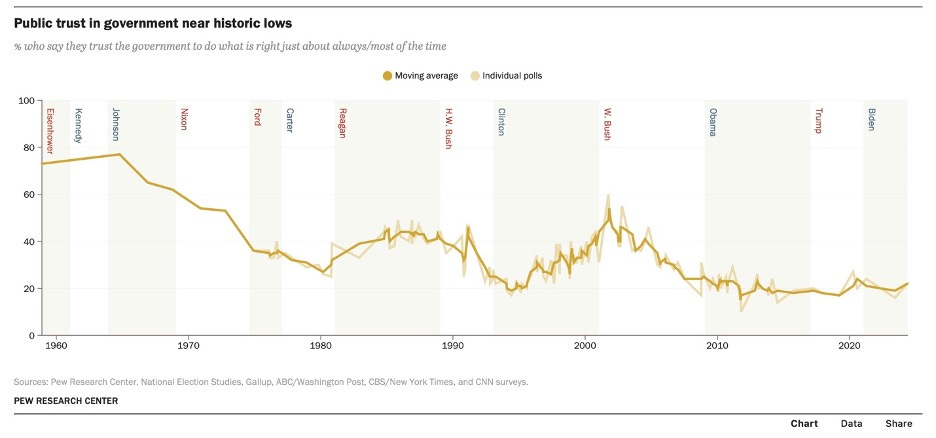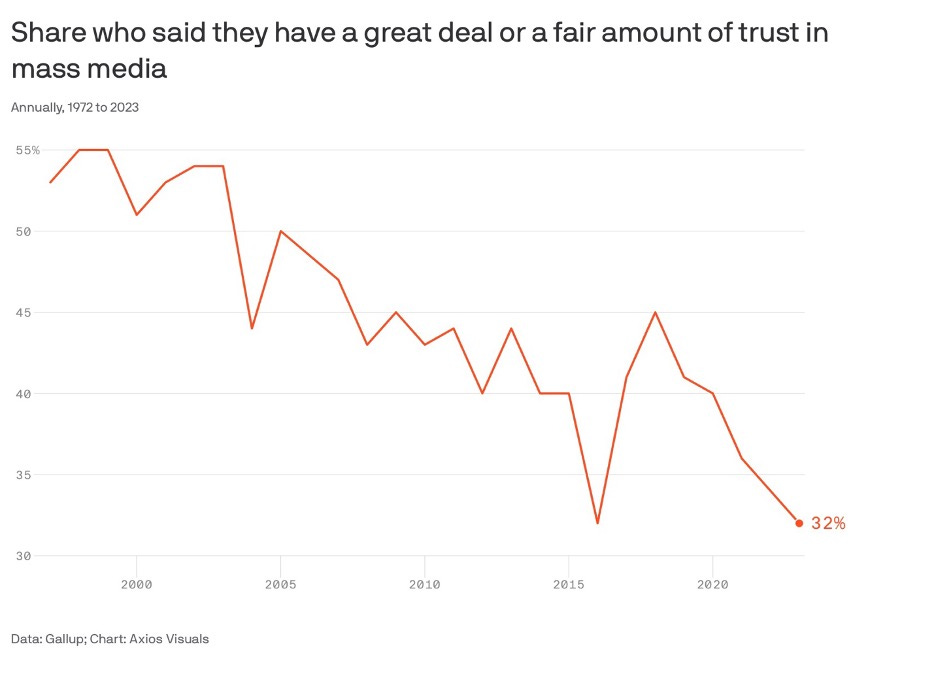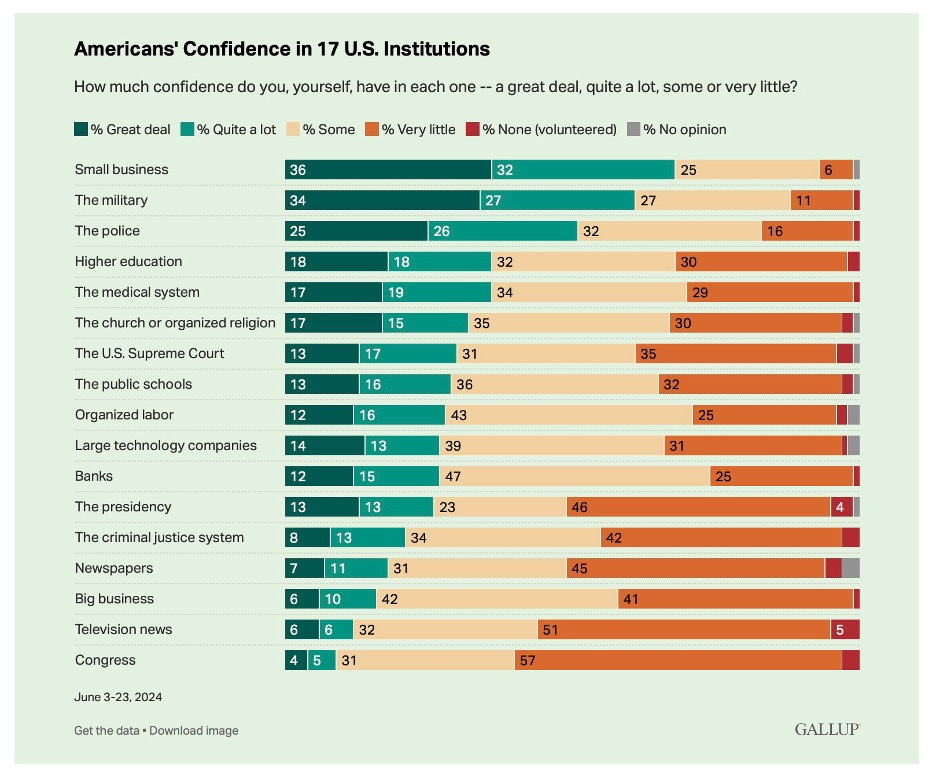A Lack of Trust makes the Truth Hard to Find
Even During National Emergencies, Americans Don’t Know Who to Believe
The Society for the Rule of Law held a webinar on October 8 covering Congressional dysfunction and possible paths to reform. I joined host Gregg Nunziata and fellow guests Kevin Kosar, Marci Harris, and Zach Graves. Click here to watch.
By Mark Strand
Americans have a trust problem. They do not trust their government. They do not trust the media. As a result, they have no idea who is telling the truth unless they see it with their own eyes (and with AI, that’s not a certainty).
That’s a problem in a country of 330 million people. It makes logical discussions impossible and forces people to rely increasingly on emotional instincts while only accepting things that confirm their preexisting biases.
We deserve better. Let’s look at a few recent studies.
Trust in government is at an all-time low and has been trending steadily downward for decades. According to Pew Research, one of the most reliable organizations when it comes to studying the views of the American people, “last year, 16% said they trusted the government just about always or most of the time, which was among the lowest measures in nearly seven decades of polling.”
When Ronald Reagan quipped that the scariest words in the English language are “we’re from the government, and we’re here to help,” he captured the essence of Americans’ lack of faith in their government. And trust in government was more than double today’s levels during Reagan’s presidency.
Yes, Republicans trust the government more when there is a Republican President, and Democrats trust the government more when there is a Democratic President. But that lends credence to the idea that people rely on their preexisting biases when in doubt.
Another study done by the Partnership for Public Service is more damning. It shows that the three most common beliefs about government are that it is wasteful (85%), corrupt (74%), and incompetent (66%). They also do not believe the government listens to them.
If you have read my writings on populism, you will recall my definition:
Populism is part of the DNA of democracies. It comes about when free people no longer believe their government is competent or willing to address their deepest concerns and fears. In one way, populism itself is merely an indicator that governments have lost touch with their citizens or, at the very least, are not communicating what their citizens need to hear. The danger of populism is that it is easily exploited by demagogues taking advantage of people’s fears and worries.
If you are wondering what caused the surge in populist movements on the Left and Right in the United States and other democracies, look no further than this chart.
Congress
Trust in Congress, while never very high, is feeble today, as the chart from Gallup shows. Besides one beautiful surge in approval following the unity Congress showed in the aftermath of the 9/11 terrorist attack on the United States (showing that the people will approve of Congress when it deserves it), people hold their own elected officials in a rather dismal light.
This is not surprising. The Senate, once called the “World’s Greatest Deliberative Body,” is now perhaps the most dysfunctional legislature in the world. It is wholly incapable of legislating. Between the filibuster’s abuse and the Majority’s refusal to allow any amendments by the Minority party, it is little more than a graveyard where House legislation goes to die. There are county legislative bodies that have a more open amendment process than the United States Senate.
The House is not much better. To get the minimum laws required to keep the government operating, the Speaker must resort to legislative sleights of hand to achieve bipartisan passage. The House behaves like a faux parliament, where the Majority party is dependent on near unanimity from their own party to pass legislation. This arrangement empowers the most extreme Members of each party since their demands cannot be offset by the votes of more moderate Members of the Minority party.
Congress has not passed a budget on time and according to law since 1996, almost 30 years ago. Instead, they wait and wait, and wait some more, until at the last minute, they run around like their hair is on fire to pass a stop-gap measure that keeps the government running for another couple of months. Both political parties do it when they are in power. It’s like an insider’s game that somehow always goes wrong.
The result is that in this fiscal year, we will run a $2 trillion budget deficit. We will borrow money to pay for every discretionary government program, including defense and interest on the national debt. Our national debt is now $35 trillion—exceeding all of the goods and services produced by our entire economy by $7 trillion.
Congress has earned its approval rating.
The Presidency
While it is hard to avoid the dozens of polls that measure an individual president’s approval rating, Americans have long viewed the institution of the presidency suspiciously regarding the accumulation of power. Former President Obama famously said he didn’t need Congress to act because he had “a pen and a phone.” President Biden has issued Executive Orders forgiving hundreds of billions in student loans. Former President Trump likes to say what he will do on “Day One” on the campaign trail.
Before President Obama, the Supreme Court only struck down an Executive Order twice in our nation’s history. Yet, power grabs by the Chief Executive have become so commonplace that the Courts have increasingly needed to overturn presidential actions that infringe on the Constitution’s Article One powers reserved to Congress.
However, according to Pew Research, Americans have been wary of increases in Presidential power for some time. Since the start of the Trump Administration and through the Biden Administration, three-fourths of Americans have consistently said “it would be too risky to give U.S. presidents more power to deal directly with many of the country’s problems.”
Trust in the Supreme Court
The Supreme Court is trusted far more than Congress or the Federal government, but its trust has also eroded over the past few years. As the chart below from Pew Research shows, much of this erosion is driven by partisan politics.
Even attempting to measure popular support for the Supreme Court is somewhat of a fool’s errand. Since the job of the Supreme Court is to protect the rights of the minority against the power of the majority, it will almost always be seen as less popular when it is doing its job as the Founders intended. Indeed, as you can easily see, Democratic trust in the Supreme Court took a nosedive when the Dobbs decision passed, returning the regulation of abortion to the states. Of course, you can imagine how popular the Supreme Court was with liberals and equally unpopular with conservatives when it handed down the original Roe v Wade decision. The Supreme Court is often at the center of the firestorm when it comes to the most controversial areas of American life.
Still, with the media’s help, President Biden and Senate Majority Leader Schumer have gone beyond past presidents in openly criticizing the Supreme Court. Not since Franklin Roosevelt threatened to pack the Supreme Court for opposing some of his New Deal initiatives has a President so openly assaulted the role of the Supreme Court in our system of government. President Biden has proposed radical changes to the structure of the Court that would most likely be found to be unconstitutional – setting up a new partisan assault on the Court.
But politicians, indeed most people, misunderstand the Court’s role. While politicians look at the polls and try to anticipate public opinion, the Supreme Court is most important when it rules against the majority opinion to protect the Constitutional rights of the political minority. That is precisely what the Supreme Court is supposed to do. The Founders rightly feared pure majority rule because they knew that in a small “d” democracy, a majority could always be counted on to impose their will on the minority, regardless of whose rights were being trampled.
The job of the Court is to protect the rights acknowledged by the Constitution, not to win elections.
The independence of the Supreme Court is one of the critical pillars of the balance of power—the inspired notion of the Founders that the concentration of power in any one branch of government was dangerous to democracy. It is, especially with Congress in its polarized state, the last bastion against creeping authoritarianism by the Executive branch of government. Diminished trust in the Court is, in and of itself, a threat to democracy.
Trust in the Media
Sadly, I could post dozens of charts showing American’s increasing lack of trust in the media. Numerous other studies done by Pew, the Washington Post, and the Association Press show that Americans do not trust the media and do not have confidence that they are accurately reporting political news.
There are lots of reasons for the loss of trust in the media. Increased internet and cable news competition challenged the mainstream media establishment, causing a loss of advertising dollars and forcing them to cut corners and eliminate expert reporters. It is difficult to compete when the internet allows people to publish their facts, often without serious documentation.
But most of all, it is because the news media is a big business. Like breakfast cereal marketing, news organizations target a market segment that will watch their programming and, most importantly, buy products advertised on their news shows. The market segments are often ideological. Fox News could not suddenly start sounding like MSNBC and not lose a large part of its target audience, and vice versa. Media outlets like MSNBC, CNN, and NewsMax deliberately display their ideological leanings because serving their ideological market segment is good business.
Still, there was a time when reporters saw their job as exposing government corruption and incompetence. It played the role of watchdog on behalf of their consumers. Today, they all too often seem like an extension of the national political parties, about as objective as a campaign press release. And that makes it less than trustworthy as a reliable source of political information.
The COVID-19 Pandemic And Public Trust
Many of these trends in the public’s trust have been long-term trends. However, the recent pandemic exacerbated the problem. Almost everything the government told us about the efficacy of masks, social distancing, vaccines, and the virus’s origin was inaccurate or incomplete. We even found out that social media companies were censoring alternative sources of information that turned out to be accurate at the request of the Biden Administration.
The virus was dangerous, especially to people with co-morbidities. The initial wave of the COVID-19 virus was highly deadly to certain people. It was made worse by government policies in places like New York, where the state government herded COVID victims into nursing homes, exposing the most vulnerable people to the deadly virus.
The government used the tools of the pandemic to impose controls and punishments that ignored the actual science. The government fired soldiers who did not get the vaccine, nurses and doctors lost their jobs, and schools were closed for an extended period, impacting the education of students who were not threatened by the virus. Government programs, like those organized by Democratic Vice-Presidential candidate Governor Tim Walz in Minnesota, encouraged people to “snitch” on neighbors who ventured out of their homes. They were almost Stalin-esque displays of government power. The presidential election rules were modified in ways and in locations that often benefited one political party and its candidates.
At the time, the people needed objective and helpful information from their leaders; instead, they grew increasingly skeptical as the government repeatedly extended draconian controls. Will citizens trust information from the government during a future pandemic or, worse, a bioweapon attack?
Who Do We Trust?
Americans trust certain parts of civil society, especially small businesses, the military, and the police. Institutions like higher education, doctors, hospitals, and churches enjoy moderate trust.
How Does this Affect Civil Society?
My wife likes to tell me that today’s conspiracy theories are tomorrow’s coming attractions. That usually elicits a chuckle, followed by an uncomfortable feeling that she may be closer to the truth than I would like to believe.
The cohesion of society suffers when we do not know who to believe. Hurricane Helene has turned into an incoherent mess. No one knows the actual death toll; eyewitnesses claim one thing, while government sources claim another. Democrats believe the government sources, and Republicans, suspicious of the government, believe what they see on platforms like X. But natural disasters should not be partisan events.
One only has to recall Hurricane Katrina to see the damage done by a lack of trust. During Katrina, the media relentlessly focused on the mistakes made by FEMA and the rumors and conspiracies generated by partisans. The difference between Katrina and Helene was that during Katrina, Republican President George Bush was president, while during Helene, Democrat Joe Biden was president. There is no denying the difference in media coverage. And that undermines trust in the media as well as the government.
FEMA is likely doing the best it can in a unique environment. Mountainous areas rarely flood, meaning new methods of meeting the challenges must be adopted. It is also highly likely that local people on the ground are the ones who need to go find the people who are cut off from food, water, and medicine. Ordinary people have performed extraordinary deeds that have saved the lives of neighbors. Elon Musk flying in Starlink systems was an enormous, good deed, allowing people without electricity and their traditional internet sources to communicate. Yet rumors, false information, and, yes, even conspiracy theories have abounded on social media. Why? Because trust in the government is low.
People should be able to believe their government in an emergency. They must be able to trust life-saving information in a natural disaster. But trust is earned. Another hurricane will hit the coast of Florida within the next few days. Florida residents, however, are likely to believe what Governor Ron DeSantis tells them during the storm. Why? Because he has earned their trust through his past performance during natural disasters.
That may be the best way to end this article. Trust can be earned. Trust has two components: integrity and competence. Integrity means speaking the truth and keeping your word. Competence means being good at what you do. If our institutions are to be better trusted, they have to demonstrate both integrity and competence.
Integrity and competence would be a campaign promise we could all support. They can be tested by reality and measured by results. They are precisely what we need to restore a modicum of trust in our government.













Spot on, Mark. I think it's Jon Gabriel in another post which exposes that most Americans (except Democrats, but still a third of those) can no longer distinguish truth from falsehoods. We owe our failing institutions, especially the media, but more than that. It's more than a wake-up call - the sirens are blaring.
Well written, well sourced and well thought out, as always. But depressing.